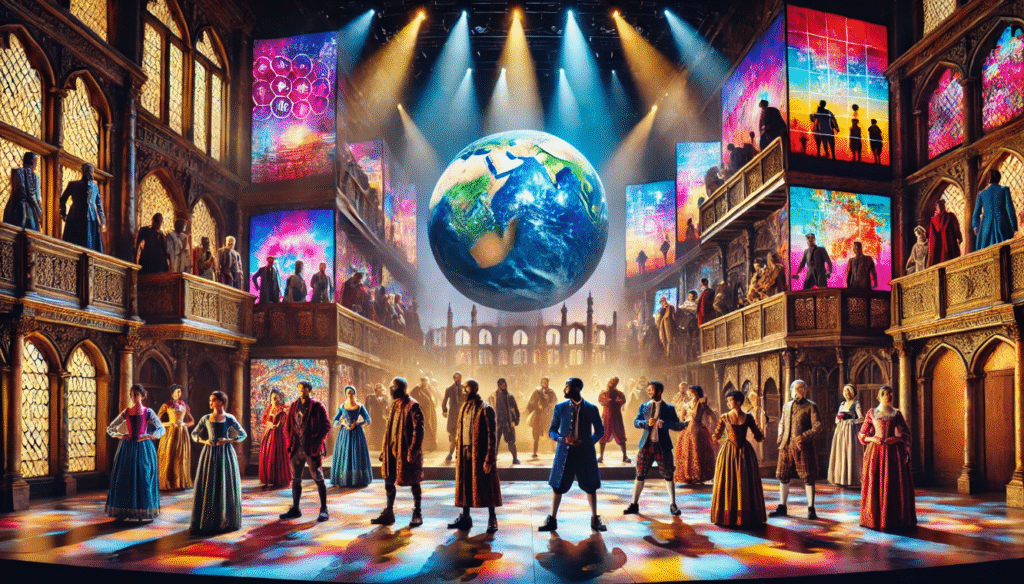
Exploring the Role of Shakespeare in the Global Theatre Movement: How His Legacy Shapes Modern Theatre Practices
Did you know that one of the world’s greatest playwrights is still shaping the way we experience theatre today? 🎭 The role of Shakespeare in the global theatre movement has endured for centuries, influencing modern plays, films, and storytelling techniques. Whether you’re an actor, director, or simply a theatre enthusiast, understanding how Shakespeare’s legacy continues to impact global theatre practices is essential.
But why does this matter to you? 🤔 In a world where theatre is constantly evolving, Shakespeare’s timeless themes and groundbreaking techniques offer valuable insights that can help you engage with contemporary performances more deeply and authentically. This article will show you how his influence still resonates, from character development to innovative storytelling methods that are applied worldwide.
Table of Contents
Toggle1: Shakespeare’s Historical Impact on Theatre
When Shakespeare began writing in the late 16th century, the world of theatre was a very different place. 🎭 At the time, plays were often crude and simple, focusing on surface-level drama with predictable plots. Shakespeare, however, transformed the art form, leaving behind a legacy that still influences every corner of the stage today.
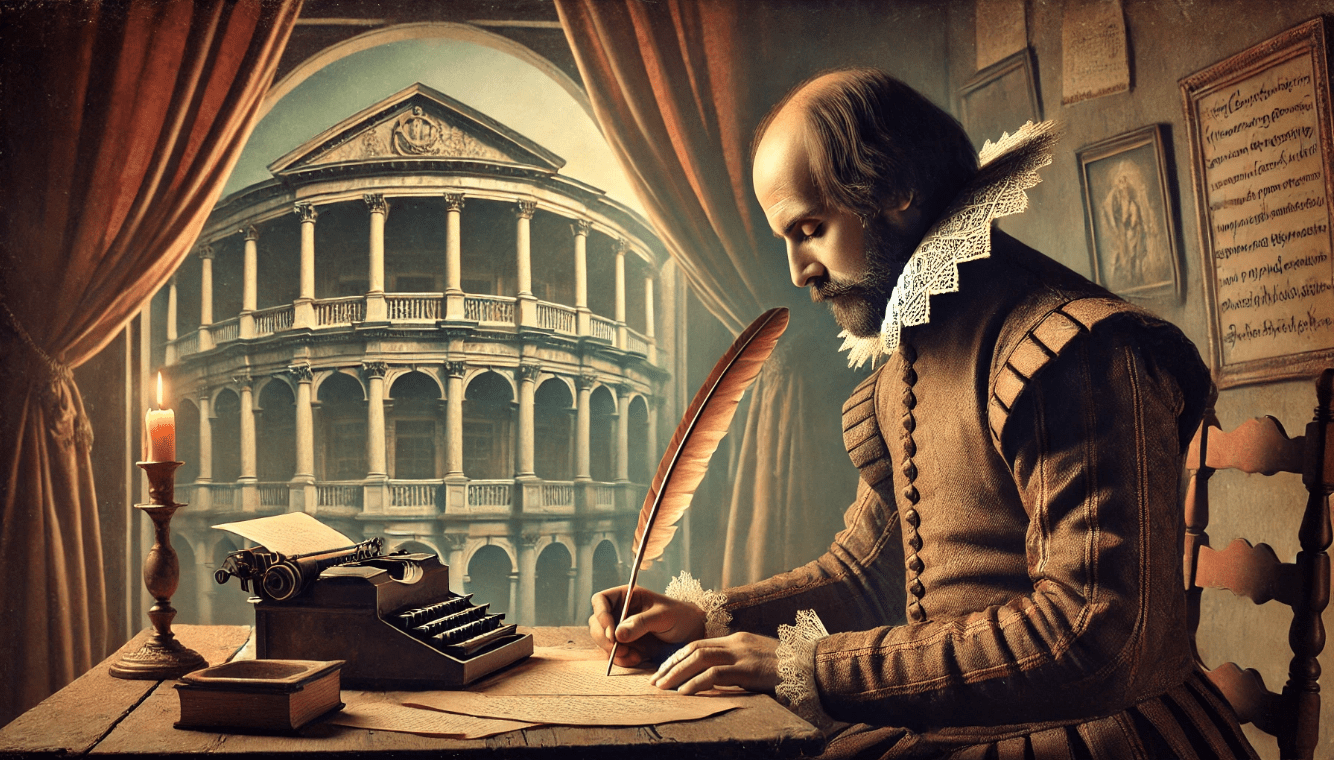
Elevating the Art of Playwriting
Shakespeare’s most significant contribution was in the realm of storytelling. Before his time, characters in plays were often one-dimensional, serving as mere vessels for plot progression. Shakespeare changed that by introducing complex, multi-layered characters with rich inner lives. 💡 This shift allowed audiences to connect more deeply with the characters, experiencing their emotional turmoil, joy, and tragedy in a way that had never been done before.
Redefining Dramatic Structure
Shakespeare also redefined the structure of plays. He expanded the boundaries of genres, blending comedy, tragedy, and history in ways that had never been done before. His plays, like Hamlet and Macbeth, broke away from traditional formulas and ventured into psychological depth, showcasing the complex nature of human emotions and motivations. 📜
The Language of Theatre
Another lasting impact of Shakespeare’s work is his contribution to the English language. He popularized phrases and words that are still used today—words like “swagger,” “bedazzled,” and “lonely.” His poetic use of language helped elevate the art of dialogue in theatre, making it not just a medium for entertainment, but a form of artistic expression. 📝
Shakespeare’s Lasting Influence
Today, Shakespeare’s influence on theatre is undeniable. His works are still performed worldwide, and his writing serves as a foundation for training actors and directors. Whether you’re a beginner or an expert, learning about Shakespeare’s historical impact helps you understand the evolution of modern theatre and the practices that continue to shape the stage today.
2: Shakespeare’s Influence on Modern Playwriting and Storytelling

Shakespeare’s impact on modern playwriting and storytelling is undeniable. His innovative techniques are still being used by playwrights, filmmakers, and writers around the world today. Let’s break down how his methods continue to shape the way we create stories and characters in the 21st century. ✨
Complex Characters and Psychological Depth
One of Shakespeare’s greatest contributions to modern storytelling is his complex characters. Gone are the days of flat, one-dimensional characters. Shakespeare’s characters, such as Hamlet, Lady Macbeth, and Othello, are filled with conflicting emotions, desires, and motivations. These deeply human qualities make them timeless and relatable. 💭
Layered Plots and Emotional Conflict
Shakespeare mastered the art of weaving multiple layers into a single plot, with intricate relationships and conflicts. Whether it’s the tragic downfall of Macbeth or the tangled love story in A Midsummer Night’s Dream, Shakespeare’s stories offer rich layers of meaning that engage the audience on an emotional level. 🎭
Themes of Universal Human Experience
Another key element of Shakespeare’s storytelling is his ability to explore universal themes—love, ambition, jealousy, power, and betrayal. These timeless topics resonate with audiences across time, culture, and geography. 🌍
Influence on Modern Playwrights
Modern writers, from Arthur Miller to Tom Stoppard, continue to draw inspiration from Shakespeare’s approach to character development and plot complexity. For example, Miller’s Death of a Salesman explores the tragic flaws of its characters, much like Shakespeare’s tragedies. Meanwhile, Stoppard’s Rosencrantz and Guildenstern Are Dead plays with existential themes and the concept of fate, akin to Shakespeare’s own metaphysical questions. 📚
Shakespeare’s Lasting Legacy in Modern Storytelling
From Broadway to Hollywood, Shakespeare’s influence is alive and well. Films like The Lion King (based on Hamlet) and modern adaptations of Romeo and Juliet, such as West Side Story, show how Shakespeare’s storytelling continues to inspire new generations of writers and directors. 🎬
Shakespeare’s influence on modern playwriting and storytelling has paved the way for some of the most compelling narratives in theatre and film. By incorporating his techniques—whether it’s complex characters, layered plots, or universal themes—you can elevate your own storytelling to a new level.
3: Shakespeare’s Influence on Global Theatre Movements
Shakespeare’s impact on the world of theatre extends far beyond the English-speaking world. 🌍 His works have transcended cultural boundaries, influencing theatre movements across continents and inspiring countless adaptations and performances. Let’s explore how Shakespeare’s legacy has shaped global theatre, making his works a universal phenomenon.
Shakespeare’s Universality: Themes that Transcend Culture
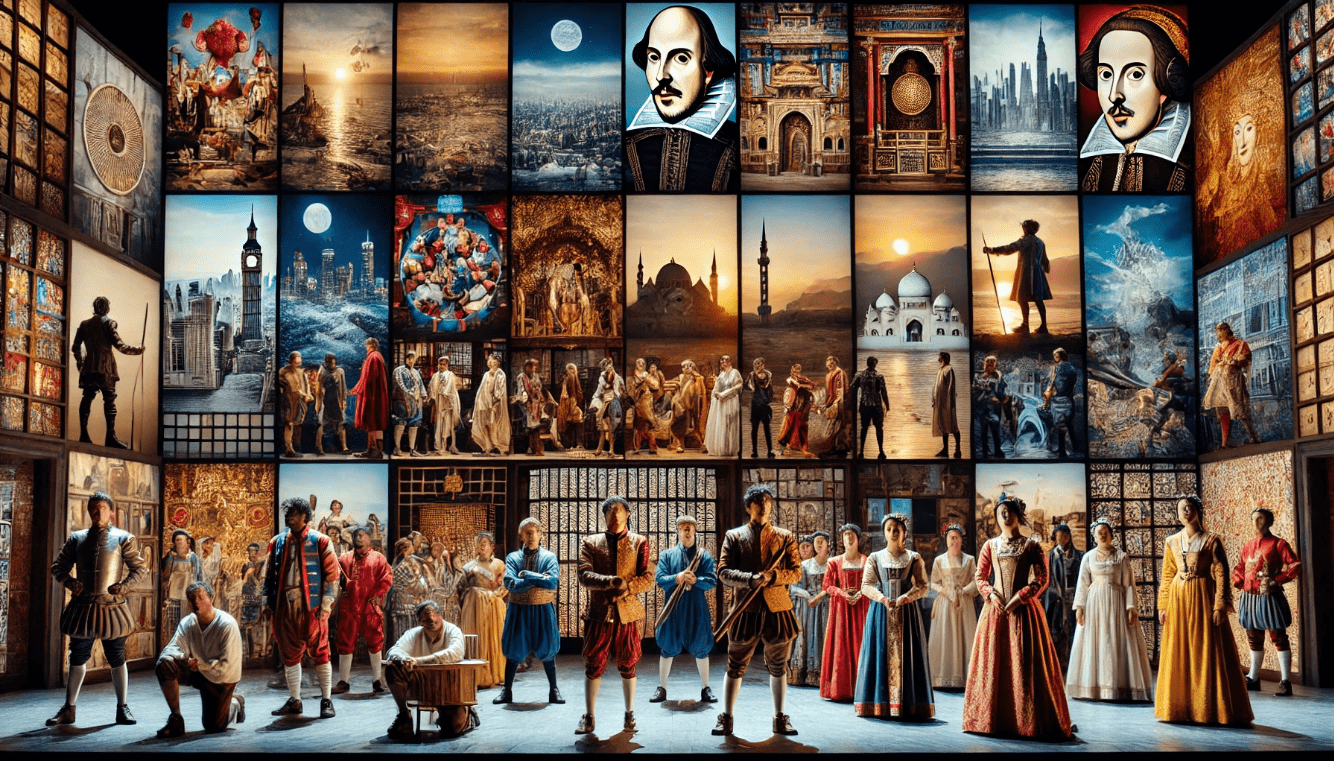
Shakespeare’s themes—love, betrayal, ambition, and power—are timeless and universal. These themes resonate with audiences from all walks of life, regardless of their cultural background. From the streets of New York to the stages of Tokyo, Shakespeare’s works are adapted to reflect the unique values, struggles, and experiences of diverse audiences.
Shakespeare in Non-Western Theatre
Around the world, theatre companies have adapted Shakespeare’s plays to reflect their own cultural contexts. For example:
- In India, Bollywood films like Maqbool and Omkara are based on Macbeth and Othello, respectively, blending Shakespearean drama with Indian storytelling and aesthetics.
- In Africa, directors like the late Peter Brook have staged Shakespeare’s plays using traditional African performance styles, showing how his works can be reinterpreted through local cultural lenses.
- In Japan, the Noh and Kabuki theatre traditions have influenced adaptations of Shakespeare, like The Tragedy of Macbeth, which blends Western theatre with Eastern performance techniques.
Global Shakespeare Festivals and Cultural Events
Shakespeare’s influence is celebrated globally through major theatre festivals, such as:
- The Globe Theatre in London: A symbol of Shakespeare’s enduring legacy, the Globe continues to perform his plays year-round, drawing international visitors and actors.
- Stratford Festival in Canada: One of the largest Shakespeare festivals in the world, attracting global talent and audiences.
- Shakespeare in the Park in New York City: A free annual event that celebrates Shakespeare’s work in an outdoor, public setting, making his plays accessible to a diverse audience.
These festivals not only showcase Shakespeare’s plays but also encourage cross-cultural dialogue and the exchange of ideas between different theatre traditions. 🎭
Shakespeare’s Role in Political and Social Movements
Shakespeare’s plays have also been a tool for social and political commentary. In times of social upheaval, directors have used Shakespeare’s works to comment on issues such as inequality, power, and justice. For example:
- In the Arab world, adaptations of Hamlet and King Lear have addressed themes of political corruption and the struggles for justice.
- In Eastern Europe, during times of political unrest, Shakespeare’s plays were used as a form of protest, reflecting the desire for change and freedom.
Shakespeare’s ability to explore deep human questions has made his work a powerful vehicle for political expression in different parts of the world. 🌍
Shakespeare’s Influence on Modern Global Playwrights
Today, many prominent playwrights draw direct inspiration from Shakespeare’s works. Writers like Tom Stoppard, Tennessee Williams, and Arthur Miller have echoed Shakespeare’s themes of human nature and conflict in their own plays, often incorporating elements of his writing style or exploring similar themes.
4: The Continuing Evolution of Shakespeare’s Works in Modern Theatre
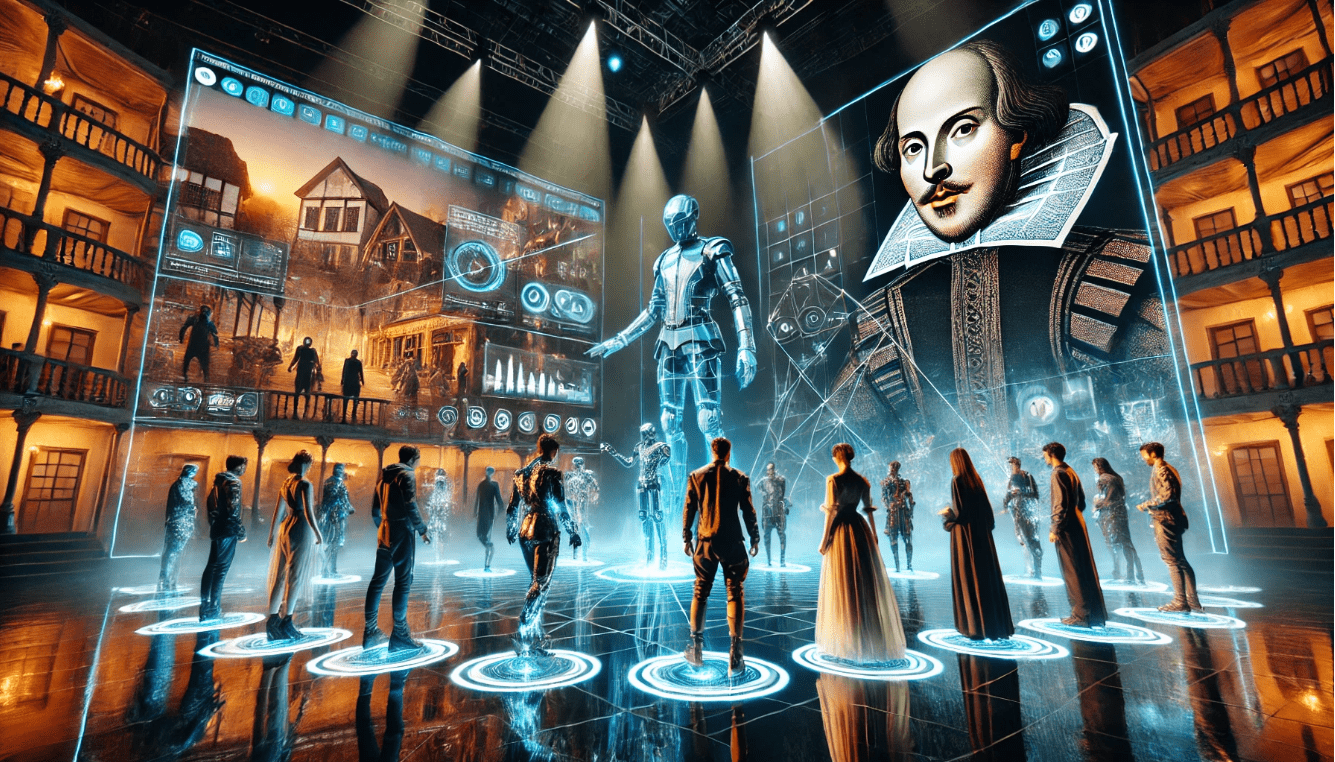
Shakespeare’s works have been performed, adapted, and reimagined for centuries, but their evolution is far from over. 🎭 In modern theatre, directors and playwrights continue to breathe new life into his plays, making them relevant to today’s audiences. Let’s explore how Shakespeare’s works are constantly evolving in contemporary productions and how you can draw inspiration from these innovative adaptations.
Modern Interpretations of Shakespeare’s Characters
Shakespeare’s characters are multi-dimensional, allowing for a wide range of interpretations. Today’s theatre artists often take creative liberties with Shakespeare’s characters to reflect modern sensibilities, social issues, and diverse perspectives. For example, Hamlet may be played as a contemporary figure grappling with mental health issues, or Macbeth could be portrayed as a modern corporate villain.
Innovative Staging and Technology in Shakespearean Productions
In the past, Shakespearean plays were often performed on simple stages with minimal special effects. Today, technology has expanded the ways in which Shakespeare’s works are staged. Directors are incorporating digital projections, immersive soundscapes, and even virtual reality into their productions. This blending of traditional theatre with cutting-edge technology allows for a new dimension of storytelling.
Shakespeare in Non-Traditional Settings
One of the most exciting aspects of modern Shakespeare productions is the reimagining of traditional settings. Modern directors often place Shakespeare’s plays in unconventional or contemporary environments to highlight their relevance. For instance:
- Romeo and Juliet set in a high school, making the family feuds more relatable to a younger audience.
- The Tempest performed in an outdoor, natural setting, emphasizing themes of isolation and nature’s power.
Diverse Casts and Inclusive Performances
Shakespeare’s works are often adapted to feature more diverse and inclusive casts, giving actors from various backgrounds the opportunity to play iconic roles. This approach challenges traditional casting practices and opens up Shakespeare’s plays to a broader range of voices. For example, Othello may be cast with an actor from a different ethnic background, or gender roles in plays like Twelfth Night may be switched to explore new dynamics.
Breaking the Fourth Wall: Interactive Shakespeare
Another exciting trend in modern Shakespearean theatre is the increased use of audience interaction. Some productions invite the audience to engage directly with the actors, blurring the lines between performer and viewer. For instance, A Midsummer Night’s Dream may include interactive elements where the audience becomes part of the fairy world, or The Merchant of Venice might involve the audience in courtroom scenes.
Shakespeare in Film and Digital Media
Shakespeare’s influence has extended beyond the theatre, with numerous adaptations in film, television, and online platforms. Films like 10 Things I Hate About You (a modern retelling of The Taming of the Shrew) and Baz Luhrmann’s Romeo + Juliet have taken Shakespeare’s themes and characters into new genres. Meanwhile, digital platforms like Netflix and YouTube host modern interpretations that introduce Shakespeare to an even broader, tech-savvy audience.
5: Shakespeare’s Influence on Modern Theatre Training and Education
Shakespeare’s impact isn’t limited to the stage—his legacy is also deeply embedded in theatre education and actor training worldwide. Whether you’re a student at a drama school or a professional actor honing your craft, studying Shakespeare is crucial for developing key skills that will help you succeed in modern theatre. 🎭
Shakespeare as the Foundation of Theatre Education

Shakespeare’s works are central to most acting curriculums and theatre training programs. His plays are often considered the gold standard for understanding complex characters, mastering emotional range, and developing language skills. When actors study Shakespeare, they learn not only the technical aspects of acting, but also how to express deep emotion, navigate intricate language, and handle challenging material. 📚
Practical Insight for Actors: If you’re new to acting, start by focusing on Shakespeare’s more approachable works, like A Midsummer Night’s Dream or Twelfth Night. These plays will help you get comfortable with his language and develop essential acting skills. As you advance, tackle more complex plays like King Lear or Hamlet to refine your craft.
Mastering Language and Speech
One of the key reasons why Shakespeare is a cornerstone of theatre training is his unique use of language. Shakespeare’s command of English, from his poetic verses to the use of iambic pentameter, challenges actors to develop their vocal abilities and diction. Mastering Shakespeare’s dialogue not only helps actors improve their speech and pronunciation, but it also expands their emotional range, as they must convey complex emotions using rich, rhythmic language. 🗣️
Practical Insight for Aspiring Actors: To master Shakespearean dialogue, practice with speech exercises that focus on rhythm and pacing. Break down his lines by syllables, and focus on how the emotion shifts with each part of the verse. This will help you better express the depth of the character.
Shakespeare as a Tool for Emotional Range
Shakespeare’s characters are known for their emotional depth and complexity. As an actor, playing roles like Hamlet, Lady Macbeth, or Othello forces you to delve into a wide range of emotions—from rage to sorrow, from love to betrayal. These roles push actors to tap into their emotional intelligence, making Shakespeare’s works an essential part of actor training. 🎭
Practical Insight for Theatre Students: If you’re working on a Shakespearean monologue, focus on exploring the emotional arc of the character. What does the character feel at the beginning of the speech, and how does that emotion evolve? Understanding the emotional journey is crucial for a compelling performance.
The Importance of Shakespeare in Directing
For theatre directors, understanding Shakespeare is just as essential as understanding acting. Shakespeare’s intricate plots, rich themes, and complex characters provide directors with endless opportunities to explore how the story is told through staging, pacing, and character interactions. Modern directors frequently draw on Shakespeare’s plays to experiment with innovative interpretations and staging techniques. 🎬
Practical Insight for Directors: When directing a Shakespearean play, think about how modern settings or diverse casts can add new layers to the story. How can you use space, movement, and visual elements to enhance the emotional impact of the play? Shakespeare’s works offer a solid foundation for creative experimentation.
Shakespeare in Global Theatre Education
Shakespeare is studied and performed not just in English-speaking countries, but around the globe. International acting schools and theatre programs incorporate his plays as a core part of their curriculum, adapting them to different cultures and languages. By studying Shakespeare’s work, actors and directors learn how to connect with audiences across borders and cultures, making his influence truly global. 🌍
Practical Insight for Global Theatre Students: If you’re training in a non-English-speaking country, explore how Shakespeare’s plays have been adapted in your region. Understanding local interpretations can deepen your appreciation for his universal appeal and offer new ideas for your performances.
6: Why Shakespeare Still Matters in the 21st Century
In today’s fast-paced world of digital entertainment and shifting cultural trends, you might wonder: Why does Shakespeare still matter? 🧐 Despite being written over 400 years ago, his works continue to captivate modern audiences. Here’s why Shakespeare’s influence remains powerful and relevant in the 21st century. 🌍
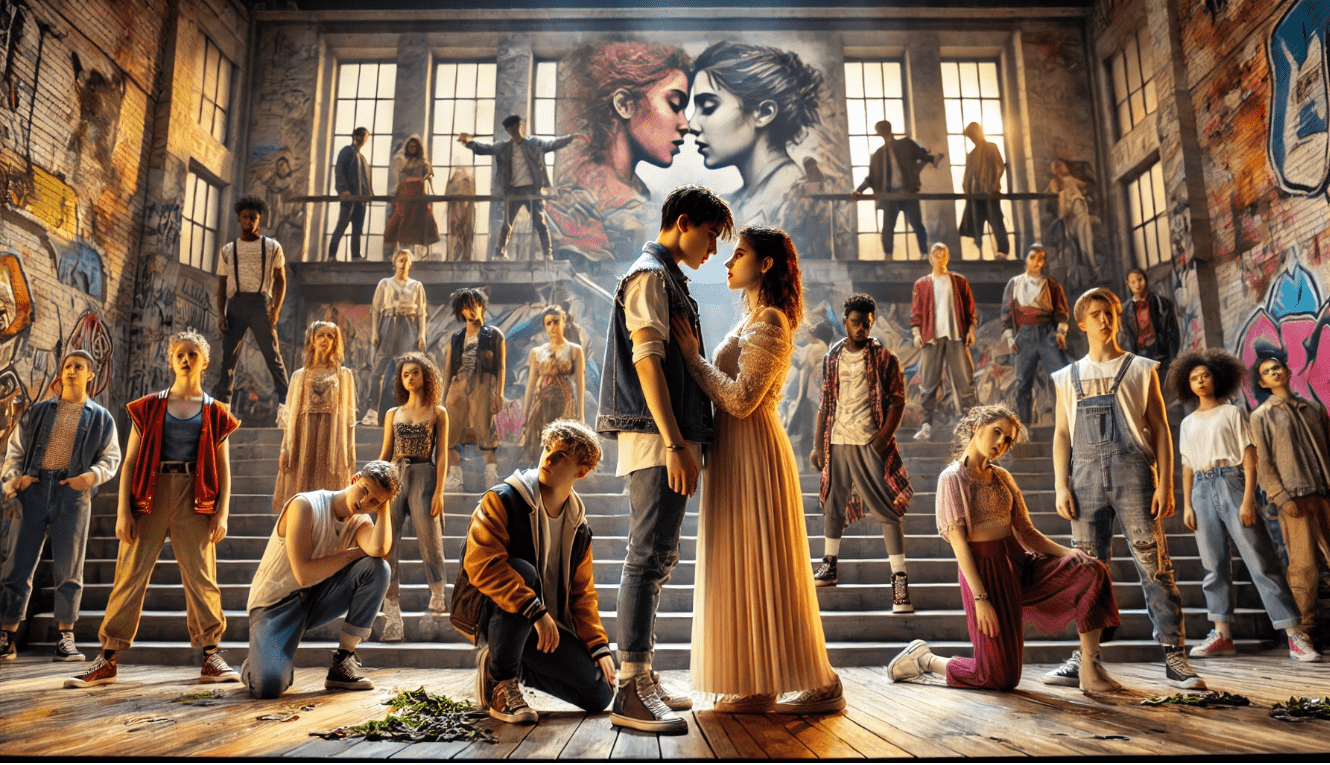
Timeless Themes That Resonate with Today’s Society
Shakespeare’s plays explore universal themes like love, ambition, jealousy, betrayal, and power—issues that still affect us today. These timeless topics resonate with audiences from all walks of life, making his work endlessly relevant. For instance, Macbeth addresses the corrupting influence of power, while Romeo and Juliet explores the consequences of family conflict and forbidden love. These themes are as applicable in today’s world as they were in Shakespeare’s time.
Shakespeare’s Exploration of Human Nature
Shakespeare had an incredible ability to tap into the complexities of human nature. His characters aren’t simply good or bad—they’re multifaceted and struggle with internal conflicts, moral dilemmas, and complex motivations. In Hamlet, we see a prince grappling with his duty to avenge his father and his own doubts about morality. In King Lear, we witness the painful breakdown of familial bonds, revealing the vulnerability of aging and power
Shakespeare’s Influence on Modern Media
Shakespeare’s influence goes far beyond the theatre. His stories, characters, and themes continue to inspire writers, filmmakers, and content creators. Movies like The Lion King (based on Hamlet) and 10 Things I Hate About You (based on The Taming of the Shrew) show how his works can be reimagined for different mediums. Even in video games, Shakespeare’s influence can be seen in narratives that explore power struggles, revenge, and tragedy.
Shakespeare as a Tool for Social Commentary
Shakespeare’s plays are not just timeless stories; they also act as a lens for social critique. In works like The Merchant of Venice and Othello, Shakespeare tackles issues such as racism, religious intolerance, and class divides—subjects that continue to be central in today’s global conversations. His ability to address social and political issues through the lens of human experience is one reason why his work still feels fresh and relevant.
The Global Reach of Shakespeare’s Works
Shakespeare’s impact is not confined to English-speaking countries. His works have been translated into every major language and performed worldwide. Directors in places like India, Africa, and China have adapted his plays to reflect local cultures, while still preserving the universal themes at their core. Shakespeare’s adaptability across different cultures is a testament to the universal appeal of his stories.
Shakespeare in Education: A Gateway to Critical Thinking
In the classroom, Shakespeare remains an essential part of literature and theatre education. Studying his works challenges students to think critically about language, character development, and thematic depth. Shakespeare’s writing pushes students to analyze complex ideas and examine the nuances of human behavior—skills that are valuable both on and off the stage.
7: The Future of Shakespeare in Global Theatre
Shakespeare’s legacy continues to shape theatre worldwide, but what does the future hold for his works in global theatre? As we move further into the 21st century, new technologies, evolving cultural perspectives, and fresh approaches to storytelling are transforming how we engage with Shakespeare. Let’s take a look at how Shakespeare’s work is evolving and where it’s headed in the future. 🌍✨
Embracing Digital and Virtual Performances
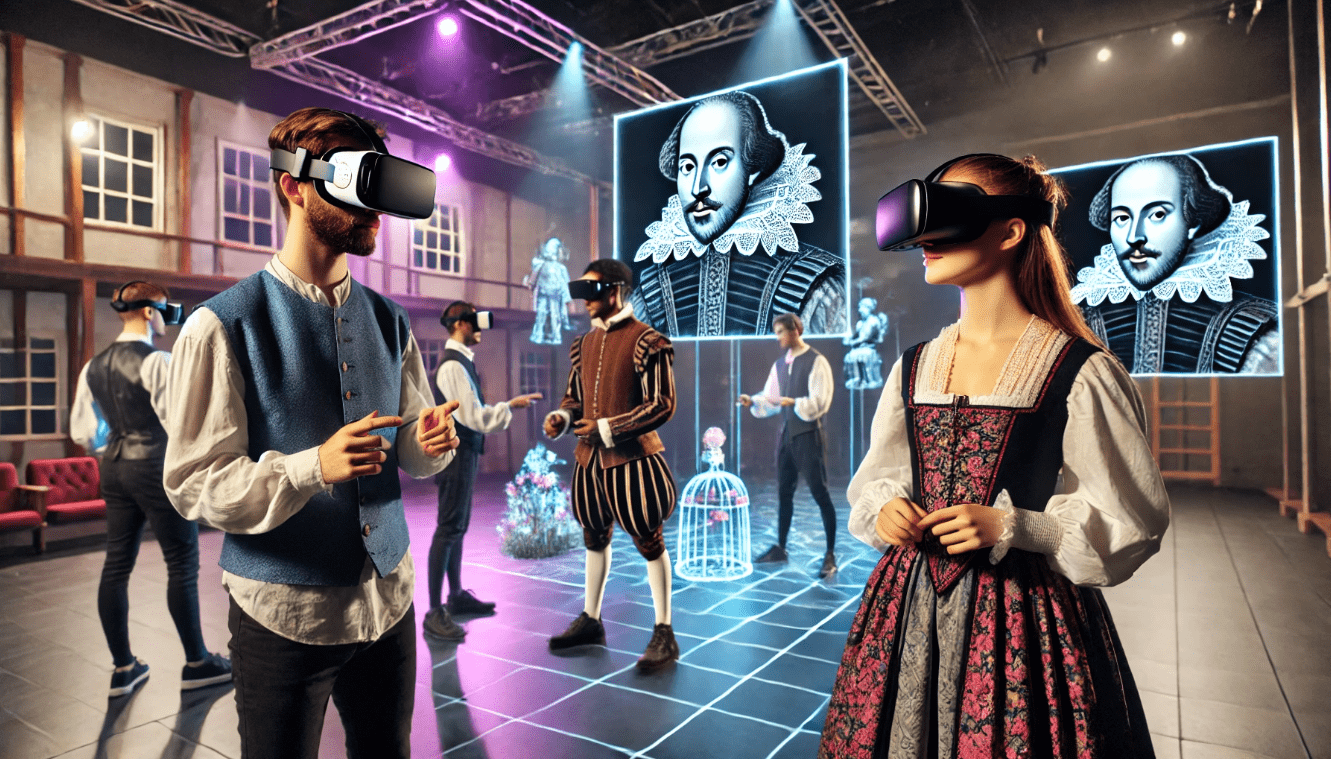
One of the most exciting developments in the future of Shakespearean theatre is the rise of digital and virtual performances. With advances in technology, theatre companies are experimenting with live-streamed plays, interactive experiences, and virtual reality (VR) adaptations. For example, productions of Hamlet or Macbeth might be streamed globally, giving audiences around the world access to high-quality performances without leaving their homes.
Interactive and Immersive Theatre Experiences
Another trend that’s gaining momentum is immersive and interactive theatre. Instead of sitting in the audience, spectators may find themselves actively participating in the play. This could involve moving through different rooms or environments, interacting with actors, or even making decisions that affect the storyline. Productions like Sleep No More, a reimagining of Macbeth, have already explored this type of experience, and Shakespeare’s works are perfect for this kind of innovative storytelling.
Shakespeare Through a Modern Lens: Social and Cultural Adaptations
As society continues to evolve, so too does the way we interpret Shakespeare’s plays. Today, many theatre companies are adapting Shakespeare’s works to explore contemporary issues like gender, race, and identity. For example, gender-swapping traditional roles or casting actors from diverse backgrounds not only adds new layers of meaning but also makes Shakespeare’s work more inclusive and relevant to today’s diverse audiences.
Global Collaborations and Cross-Cultural Adaptations
Shakespeare’s works are global treasures, and their future lies in the continued blending of cultural influences. We’ve already seen how directors in India, Africa, and Asia have adapted his plays to reflect their unique cultures, and this trend will only grow. The future of Shakespeare in global theatre is about cross-cultural exchange, where different traditions and artistic styles meet to create something new and exciting.
Shakespeare’s influence on global theatre is nothing short of extraordinary. From revolutionizing playwriting and character development to shaping modern storytelling and performance practices, his legacy continues to inspire theatre artists around the world. 🌍 Whether through timeless themes, complex characters, or groundbreaking innovations in performance, Shakespeare’s works remain as relevant today as they were in the 16th century.
As we look to the future, the ways in which his plays are adapted and performed will only continue to evolve. With digital platforms, immersive theatre, and cross-cultural adaptations, Shakespeare’s works are being reimagined to resonate with contemporary audiences across the globe. 🎭
Frequently Asked Questions (FAQs)
1. How did Shakespeare influence modern theatre?
Shakespeare revolutionized theatre by introducing complex characters, psychological depth, and intricate plots. His innovative use of language and exploration of universal themes like love, power, and betrayal laid the foundation for modern storytelling in theatre, film, and literature.
2. Why are Shakespeare’s plays still relevant today?
Shakespeare’s plays remain relevant because they tackle timeless themes such as love, ambition, and human conflict, which still resonate with audiences. His complex characters and exploration of human nature make his work universally applicable, even in today’s world.
3. What is the significance of Shakespeare’s language in theatre?
Shakespeare’s use of language, particularly iambic pentameter, has influenced how dialogue is crafted in modern theatre. His rich vocabulary and poetic form challenge actors to master diction, emotion, and rhythm, enhancing their performance skills.
4. How have Shakespeare’s works been adapted in different cultures?
Shakespeare’s works have been adapted across various cultures to reflect local values and issues. For example, Bollywood has reinterpreted Macbeth in films like Maqbool, while African theatre directors have infused his plays with traditional storytelling techniques, creating a unique global impact.
5. What makes Shakespeare’s characters so enduring?
Shakespeare’s characters are multi-dimensional and experience deep internal conflicts, making them relatable to audiences across generations. Their complexity allows actors and directors to explore a wide range of emotions, making these roles adaptable and timeless.
6. How can I apply Shakespeare’s storytelling techniques in my own writing?
To apply Shakespeare’s techniques, focus on developing multi-layered characters, creating intricate plots with emotional depth, and exploring universal themes. Consider using dialogue that reflects inner turmoil or contradiction, just as Shakespeare did to enhance dramatic tension.
7. What is the future of Shakespeare in modern theatre?
The future of Shakespeare in modern theatre involves embracing new technologies like virtual reality and digital performances, along with diverse interpretations of his plays that reflect contemporary issues. These innovations will help bring Shakespeare’s timeless works to new, global audiences.
8. Why is Shakespeare still important in theatre education?
Shakespeare remains a core part of theatre education because his works provide a solid foundation for understanding character development, emotional range, and complex storytelling. His plays challenge students to think critically about language and human behavior, essential skills for any actor or director.
